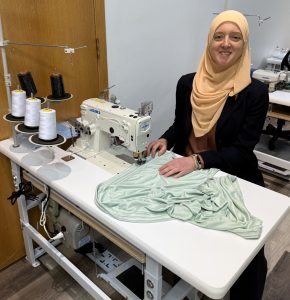Apprenticeship program fuses creativity with sustainability
By Lynne Conner For Chronicle Media — July 24, 2025
Sarene Alsharif, co-owner of Tad More Tailoring and Alterations in Rockford, stands at a sewing machine in a Tad More Sustainability Institute classroom (Photo by Lynne Conner/For Chronicle Media)
A new career training program that fuses creativity with sustainability has debuted in Rockford.
The Tad More Sustainability Institute offers students a paid apprenticeship to learn the art of sewing and alterations. After completing the program, students receive certification as industrial sewing machine operators from the U.S. Department of Labor.
“The TMSI came from the need for more ‘home-grown’ sewists,” said Sarene Alsharif, co-owner of Tad More Tailoring and Alterations. “Since opening Tad More Tailoring in 2017, we have identified a demand in the sewing and fashion community for skilled tailors and the need for a curriculum to train them.”
The TMSI is located in renovated commercial space adjacent to Tad More Tailoring in the Mulford Village Mall. The institute features a primary ground-floor classroom for sewing instruction equipped with 20 sewing machines, as well as a smaller upstairs classroom and private offices.
“The process of making the TMSI a reality started in August of 2024,” Alsharif said. “With assistance from the Workforce Connection, state, county and city leaders, we were able to establish the TMSI as an apprenticeship program.
“By using this model, students receive hands-on training and are paid full-time wages during their apprenticeships. This eases the financial burden of tuition and allows them to receive accreditation by the U.S. Department of Labor. Most importantly, TMSI graduates are ready to enter the workforce.”
Tuition for TMSI is $10,000, but Alsharif said that apprentices who qualify for job training through the Workforce Connection can receive financial assistance to offset tuition.
By establishing TMSI as a nonprofit organization, Alsharif was able to secure start-up grants from Winnebago County and Rockford, totaling nearly $98,000. The money comes from the Mulford and East State Tax Increment Financing fund and was approved by the City Council in August.
The mission of the TMSI — “tailoring a cleaner future by ending textile waste” — pairs perfectly with Tad More Tailoring’s business model of helping clients restyle their favorite clothes through alterations, repurposing textiles, and thrifting apparel for “new” fashions.
“The average American throws away around 70 pounds of reusable textiles every year. In total, that’s about the size of the Empire State Building going into landfills. The fashion production industry is responsible for about 10 percent of all airborne carbon emissions,” Alsharif said.
“By producing certified industrial sewists through the TMSI, we are helping to reduce the environmental impact of the fast fashion industry,” she said. “Additionally, we are encouraging people to reduce material waste by repurposing, recycling and reusing clothing and textiles they already own.”
The ideal TMSI apprenticeship candidate, Alsharif said, should be someone who “… loves clothing, enjoys working with their hands, has an artistic inclination, is looking for a long-term career and preferably someone who has graduated from high school. We also want our apprentices to have the vision of contributing to society and making it better by reducing fashion waste.”
There are currently three apprentices enrolled, and Alsharif plans to organize students into cohorts based on their previous sewing experience. She anticipates that the apprenticeship program will take between 12 and 18 months for a student to complete.
Mary Huff is currently enrolled in the TMSI and has significantly improved her sewing abilities.
“I have some experience in sewing and building costumes, however, I wanted to expand my skills and knowledge and better understand the construction of garments. I also was excited about TMSI’s emphasis on sustainability through fashion,” she said.
“As part of my apprenticeship, I have more knowledge of clothing construction, using a sewing machine, and hand sewing,” Huff said. “I’ve begun repairing and altering my clothes … and found creative ways to use scrap clothing and fabric.”
The TMSI underscores and advances Alsharif’s mission of changing the world one garment at a time.
“By teaching apprentices the sustainable art of tailoring and alterations, we have the honor of providing people with comfortable, well-fitting clothes and giving them poise, confidence and positivity,” she said.
For information on the Tad More Sustainability Institute, visit http://www.buylessclothes.org.







